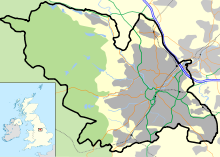Sheffield City Airport
Sheffield City Airport | |||||||||||
|---|---|---|---|---|---|---|---|---|---|---|---|
 | |||||||||||
| Summary | |||||||||||
| Airport type | Public | ||||||||||
| Owner | Peel Airports and Heliports | ||||||||||
| Operator | Sheffield City Heliport Services | ||||||||||
| Serves | Sheffield | ||||||||||
| Location | Sheffield Parkway | ||||||||||
| Elevation AMSL | 231 ft / 70 m | ||||||||||
| Coordinates | 53°23′39″N 001°23′19″W / 53.39417°N 1.38861°WCoordinates: 53°23′39″N 001°23′19″W / 53.39417°N 1.38861°W | ||||||||||
| Map | |||||||||||
 EGSY Location in Sheffield | |||||||||||
| Runways | |||||||||||
| |||||||||||
Sheffield City Airport (IATA: SZD, ICAO: EGSY) was a small airport in Sheffield; it is now closed. It was in the Tinsley Park area of the city, near the M1 motorway and Sheffield Parkway, and opened in 1997. The airport's CAA licence was withdrawn on 21 April 2008 and it was officially closed on 30 April 2008,[1] and the site is now part of the Advanced Manufacturing Park with various manufacturing businesses.

History[]
Planning[]
Although an early proposal was made in 1968 to build an airport in South Yorkshire on land near Todwick in Rotherham, the scheme came to nothing. Almost thirty years later, a consultant report suggested that Sheffield would benefit from a short-runway STOLPORT model similar to London City Airport. The lack of an airport in Sheffield was (is) due primarily to the fact there is only a limited area of flat land large enough for it. In fact the size of the airport which was eventually built was determined by this geographical factor, see topographical map of the Sheffield area. It is not coincidental that Sheffield is built on hills because the resultant rivers powered the development of its most famous industries, namely steel making and engineering.
Operations[]
The airport opened in 1997. Airlines KLM UK, Sabena, British Airways and Aer Arann offered regular passenger services between Belfast, Amsterdam, Brussels, Dublin, Jersey and London. The Amsterdam service was described by KLM UK as the best start-up they had ever experienced.[2]
Passenger figures were:
- 46,000 in 1998
- 75,000 in 1999
- 60,000 in 2000
- 33,000 in 2001
- 13,000 in 2002
Demise[]
Sheffield City opened just as the low-cost airline revolution began in the UK, a change that rapidly made the high-fare short-hop business flights model obsolete. Likewise the length of the runway limited the range of aircraft types that could use Sheffield. Most of the early low-cost airlines had planes that were unable to land at Sheffield. Nevertheless, Robin Hood Airport Doncaster Sheffield, which did have a larger runway, struggled to attract such airlines.[3][4]
The last scheduled airline pulled out of Sheffield City in 2002.
Peel Airports, who were shortly to be opening Robin Hood Airport Doncaster Sheffield airport, purchased the site in 2002. By then, the airport terminal interior had already been converted to office accommodation. Fire and rescue cover and air traffic control were both reduced along with the withdrawal of published procedures for instrument approaches.
Closure and redevelopment[]
Controversy surrounds whether Peel Airports had any incentive to promote the airport. The original lease between the Sheffield Development Corporation and Tinsley Park Ltd included a reversionary clause permitting the buyback of 80 acres (320,000 m2) of land for £1, if it could be shown that - after 10 years of opening - the airport was not financially viable. Peel's proposal to turn the airport into Sheffield Business Park was advertising land at up to £220 per square foot. The estimated profit on the site was more than £1,000,000.[5][6]
On 22 November 2012, the South and East Yorkshire Branch of the Federation of Small Businesses launched a campaign and petition against the redevelopment of the airport site. They wanted the airport's potential to be reassessed.[7] Three weeks later, a mystery bidder made a bid to Sheffield City Council to reopen the airport.[8] However, nothing came of this and construction work began in 2014.[9]
The ICAO identifier EGSY was reassigned to MOD St Athan from 1 April 2019.
Accidents and incidents[]
- On 4 February 2001, Short 360-100 registration EI-BPD, carrying 25 passengers and 3 crew,[10] was damaged beyond repair following a hard landing at Sheffield City Airport after a scheduled Aer Arann Express passenger flight from Dublin.[11] There were no injuries.
References[]
- ^ Sheffield City Airport to close Archived 19 January 2007 at the Wayback Machine
- ^ "KLM UK". www.caa.co.uk. Archived from the original on 25 September 2012. Retrieved 24 November 2012.
- ^ "Terminal Passengers 2001 - 2011" (PDF). Archived from the original (PDF) on 27 September 2012. Retrieved 1 February 2013.
- ^ [1][permanent dead link]
- ^ "Why airport failed to get off the ground". The Star. Retrieved 18 February 2019.
- ^ Sheffield Business Park
- ^ "Hundreds back airport petition". Archived from the original on 19 August 2014. Retrieved 18 February 2019.
- ^ "Mystery bidder wants to reopen Sheffield airport". Sheffield Star. 11 December 2012. Archived from the original on 16 January 2013. Retrieved 13 March 2018.
- ^ "Diggers move in at old Sheffield Airport". The Star. Sheffield. 10 September 2014. Archived from the original on 9 April 2019. Retrieved 21 October 2018.
- ^ https://reports.aviation-safety.net/2001/20010204-0_SH36_EI-BPD.pdf[bare URL]
- ^ "ASN Aircraft accident Shorts 360-100 EI-BPD Sheffield City Airport (SZD)".
External links[]
| Wikimedia Commons has media related to Sheffield City Airport & Heliport. |
- Sources for the history of Sheffield's Airports Produced by Sheffield City Council's Libraries and Archives
- Council information
- Defunct airports in England
- Transport in Sheffield
- Heliports in England
- Airports in Yorkshire
